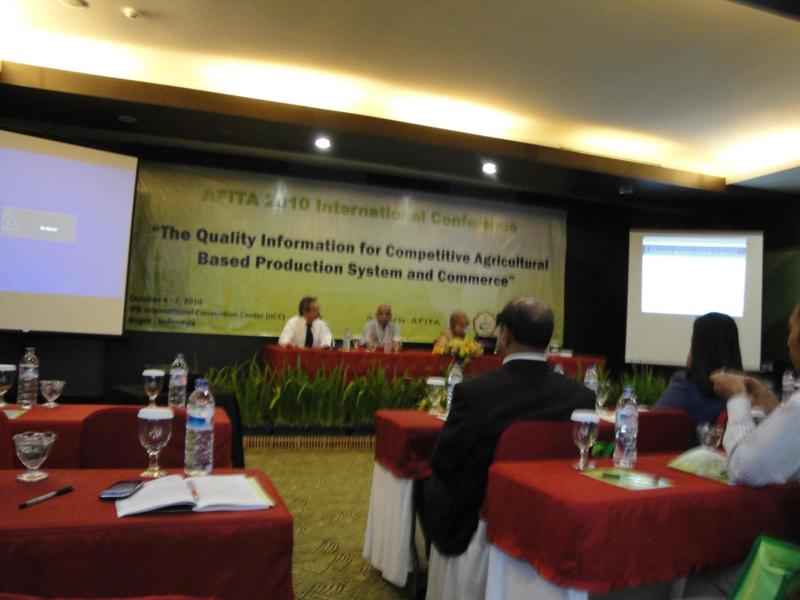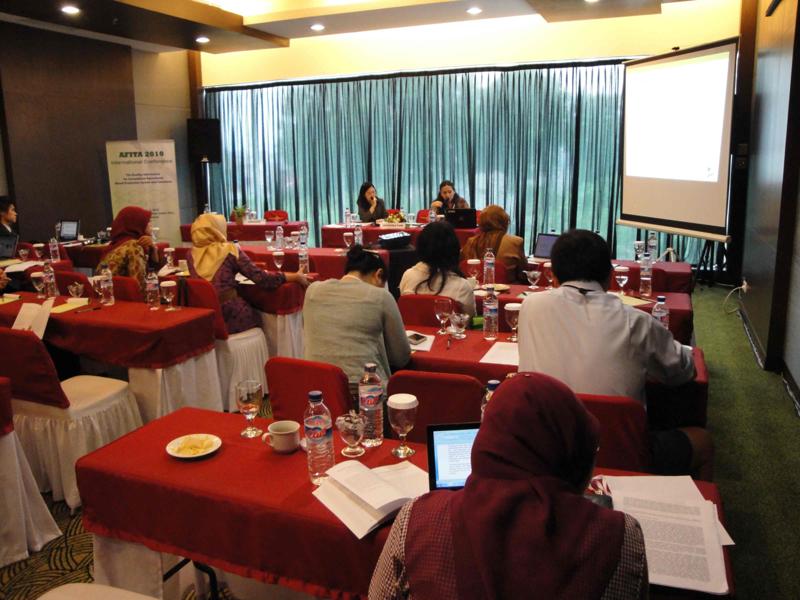

Bogor, Indonesia
3-7 October 2010
The Asian Federation of Information Technology Associations (AFITA) has held its International Conference on the theme “Quality Information for Competitive Agricultural Based Production Systems and Commerce”. The Conference has been organized by the Indonesian Society for Agricultural Information at Institute Pertanian Bogor International Centre, Bogor, Indonesia.
More than 60 papers, including Keynote and invited, are being presented at the Conference in addition to two Workshops on ICT Adoption in Agriculture and Agribusiness and Sensor Networks.
The theme of the Conference is of high importance to Asia as its agriculture is emerging rapidly as a commercial enterprise. The Conference has emphasized the intensive use of high quality information and use of advanced Information and Communications Technology (ICTs) to support various critical business processes in agriculture based production systems and commerce. The papers being presented at the Conference cover a range of ICT application in agriculture from those needed for and by small holder producers to advanced data management and processing through neural and sensor networks, modelling and simulation. The innovative use of mobile and handheld computing and communication devices was predominant in the presentations. Some presentations, especially from Japanese scientists and innovators, showed how small holder farmers can benefit from highly “informationalized” and “automated” production systems through use of ICT enabled decision support tools, applications and machinery and foretold of the future to come.
While opening the Conference, the Minister of Agriculture of Republic of Indonesia in his message highlighted the challenges to agricultural production in Indonesia. These echoed the challenges such as of ensuring food and nutritional security of its people, reducing poverty, meeting the challenges of climate change, loss of biodiversity, spread of transboundary diseases etc as discussed at the Asia-Pacific Regional Consultations and GCARD. In his keynote address, Professor Seishi Ninomiya of University of Tokyo, highlighted the acceleration of agricultural research due to use of ICT explaining its use in genomics and simulation through high powered, super computers. Another keynote dealt with “Counter Knowledge” or how information can be misused, if not with appropriate checks, in developing and implementing policies and strategies especially in the push towards market oriented agriculture.
The GFAR Secretariat, represented by Dr. Ajit Maru, who is also an Honorary Board Member of AFITA, led a Workshop on ICT adoption in agriculture and agribusiness. Dr. Maru reviewed challenges of information management and ICT use and adoption for agricultural research and innovation and informed the gathering on some global actions such as CIARD, CIARD.RING, recommendations from GCARD and GFAR’s ICM4ARD activities. These initiatives were also in response to calls to improve information sharing and exchange for agricultural research for development globally to meet current and emerging challenges to agriculture
A distinct feature of this International Conference was the presence of young people, especially women. Women were in a majority at this conference, indicating their emerging, central role in cutting edge, new agricultural disciplines such as ICTs and Information and Communications Management.
3-7 October 2010
The Asian Federation of Information Technology Associations (AFITA) has held its International Conference on the theme “Quality Information for Competitive Agricultural Based Production Systems and Commerce”. The Conference has been organized by the Indonesian Society for Agricultural Information at Institute Pertanian Bogor International Centre, Bogor, Indonesia.
More than 60 papers, including Keynote and invited, are being presented at the Conference in addition to two Workshops on ICT Adoption in Agriculture and Agribusiness and Sensor Networks.
The theme of the Conference is of high importance to Asia as its agriculture is emerging rapidly as a commercial enterprise. The Conference has emphasized the intensive use of high quality information and use of advanced Information and Communications Technology (ICTs) to support various critical business processes in agriculture based production systems and commerce. The papers being presented at the Conference cover a range of ICT application in agriculture from those needed for and by small holder producers to advanced data management and processing through neural and sensor networks, modelling and simulation. The innovative use of mobile and handheld computing and communication devices was predominant in the presentations. Some presentations, especially from Japanese scientists and innovators, showed how small holder farmers can benefit from highly “informationalized” and “automated” production systems through use of ICT enabled decision support tools, applications and machinery and foretold of the future to come.
While opening the Conference, the Minister of Agriculture of Republic of Indonesia in his message highlighted the challenges to agricultural production in Indonesia. These echoed the challenges such as of ensuring food and nutritional security of its people, reducing poverty, meeting the challenges of climate change, loss of biodiversity, spread of transboundary diseases etc as discussed at the Asia-Pacific Regional Consultations and GCARD. In his keynote address, Professor Seishi Ninomiya of University of Tokyo, highlighted the acceleration of agricultural research due to use of ICT explaining its use in genomics and simulation through high powered, super computers. Another keynote dealt with “Counter Knowledge” or how information can be misused, if not with appropriate checks, in developing and implementing policies and strategies especially in the push towards market oriented agriculture.
The GFAR Secretariat, represented by Dr. Ajit Maru, who is also an Honorary Board Member of AFITA, led a Workshop on ICT adoption in agriculture and agribusiness. Dr. Maru reviewed challenges of information management and ICT use and adoption for agricultural research and innovation and informed the gathering on some global actions such as CIARD, CIARD.RING, recommendations from GCARD and GFAR’s ICM4ARD activities. These initiatives were also in response to calls to improve information sharing and exchange for agricultural research for development globally to meet current and emerging challenges to agriculture
A distinct feature of this International Conference was the presence of young people, especially women. Women were in a majority at this conference, indicating their emerging, central role in cutting edge, new agricultural disciplines such as ICTs and Information and Communications Management.
